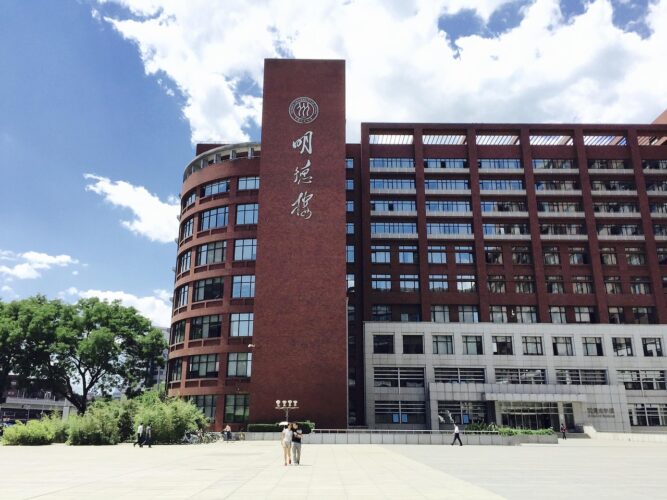Samuel Franklin, China – May 2015

上个星期,我在咖啡馆里等我的学生的时候,坐在我斜对面的人居然向我介绍了自己。我以为这个外地人有四十多岁左右,而且基于他穿的名牌服装我觉得他也是比较有钱的人。他最初用英文对我说话,后来我们一意识到我们都会日语,我们就转到了日语。最初我们的对话没有什么值得注意的,但我之所以提这件事是因为他对汉字和宗教关系的想法给我留下了印象。他问我几个问题:你知不知道“禁”这个字的来源,“船”呢?还有“乱”。我告诉他我完全不知道。我的无知使他开心,接着他解释说这些汉字和圣经的故事有密切关系。比如,他声称“禁”的林字头来自创世纪亚当和夏娃的故事。为了解释“船”和“乱”这两个字,他指出了诺亚方丹和巴别塔故事的一些细节。虽然他的理论很有意思,也让我反思我在北大学习的古代汉语,但他的想法有一些明显的问题。特别是年表和地里的问题。宗教和中文什么时候接触,在哪儿?那时已经存不存在上面的汉字?不出所料,他后来透露他是个耶和华见证人。我们聊了半个小时,谈话很愉快。
我跟四个朋友一起去了桂林和阳朔,旅行了一个星期。我们坐19个小时硬卧的火车去了桂林。没想到这列火车挺舒服的,但回北京时我们决定坐三个小时的飞机回来更方便。桂林和阳朔都非常美丽,尤其是阳朔的月亮山和介于两个城市的丽江。后者有二十块纸币上描绘的风景。我还参加了一个烹饪课程(我跟四个女生旅游了),学习了怎么做各种地道美味的阳朔风菜—我已经给妈妈有关的食谱了。的确,对我来说阳朔的特点就是其多种食品。我强烈推荐你尝那里的啤酒鱼和铁管鸡。
上周北大举办了第一场汉语大赛,所有班要参加表演。我门唱的两首歌—加说唱的茉莉花和随它吧—都受欢迎。最后,即使我们大多数的人都唱得真差,我们还得到了最佳演唱奖。
位于北京的英国大使馆举办了英国大选的现场活动。由于时差,我有机会参观大使馆看选举结果的直播。那时很热闹的气氛,以及好吃的香肠卷和红茶让我想家乡。
ENGLISH TRANSLATION:
Last week, as I was waiting for my English student to turn up in our usual café spot, the man sitting diagonally opposite me suddenly introduced himself. I thought he looked about 40 years old and based on his designer clothes I assumed him to be reasonably wealthy. He started in English, but later when we realised we both speak Japanese, we switched. At first our conversation contained nothing of note, but the reason I mention this incident is because his views on the relationship between Chinese characters and Christianity left an impression. He asked me a few questions, such as, do you know the origin of the character ‘to ban’, or the one for ‘boat’? How about the character for ‘disorder’? I replied honestly and my ignorance seemed to make him happy, as he went on to explain the close relationship between these characters and the Bible. For example, he claimed the tree radical in ‘to ban’ derives from the story of Adam and Eve in Genesis. For ‘boat’ and ‘disorder’ (which has the tongue radical) he referred to Noah’s Ark and the Tower of Babel respectively. Although his theory was very interesting, and it made me reflect on the classical Chinese I’ve been doing at Peking University, there were some obvious flaws that had to be addressed; in particular, problems of chronology and geography. When and where did the Chinese language come into contact with Christianity? At that time, didn’t the characters above already exist? Not unexpectedly, he later revealed he was a Jehovah’s Witness. By the time my student came, we had chatted pleasantly for about half an hour.
I went last month with four friends to Guilin and Yangshuo, where we travelled for a week. We took the 19 hour hard sleeper to Guilin from Beijing. Surprisingly the hard sleeper was reasonably comfortable, though we decided in the end a three hour flight back would be more convenient. Guilin and Yangshuo are both beautiful destinations, and I would highlight the Moonlight Hills and Li River in particular. The latter having the scene depicted on the back of the 20 kuai note. I also took part in a cooking class (I was travelling with four girls), where I learnt (tenuous use of the verb) to cook various authentic local dishes – the relevant recipes have already been passed on to my mum. Indeed, in my view, the highlight of these places is simply the food. I especially recommend you to try the beer fish and steel pipe chicken, if you have the chance.
Last week was also Beijing University’s Chinese Performance Competition. All classes had to participate and perform. We went for two songs – the traditional song Molihua accompanied by beatboxing and a Chinese rendition of Disney’s ‘let it go’ – both of which were well received. Even though the majority of us sing truly awfully, we still picked up the prize for best sung performance (don’t actually remember anyone else singing).
The British Embassy in Beijing hosted an event for the election, where they televised the live BBC broadcast of the results. The lively atmosphere and more importantly the delicious sausage rolls and Earl Grey tea made me a little homesick.
